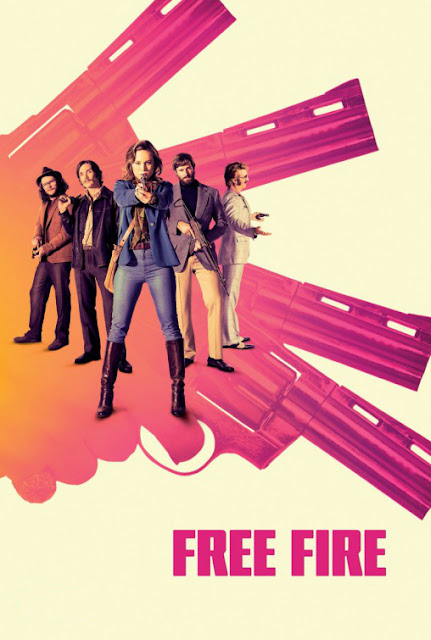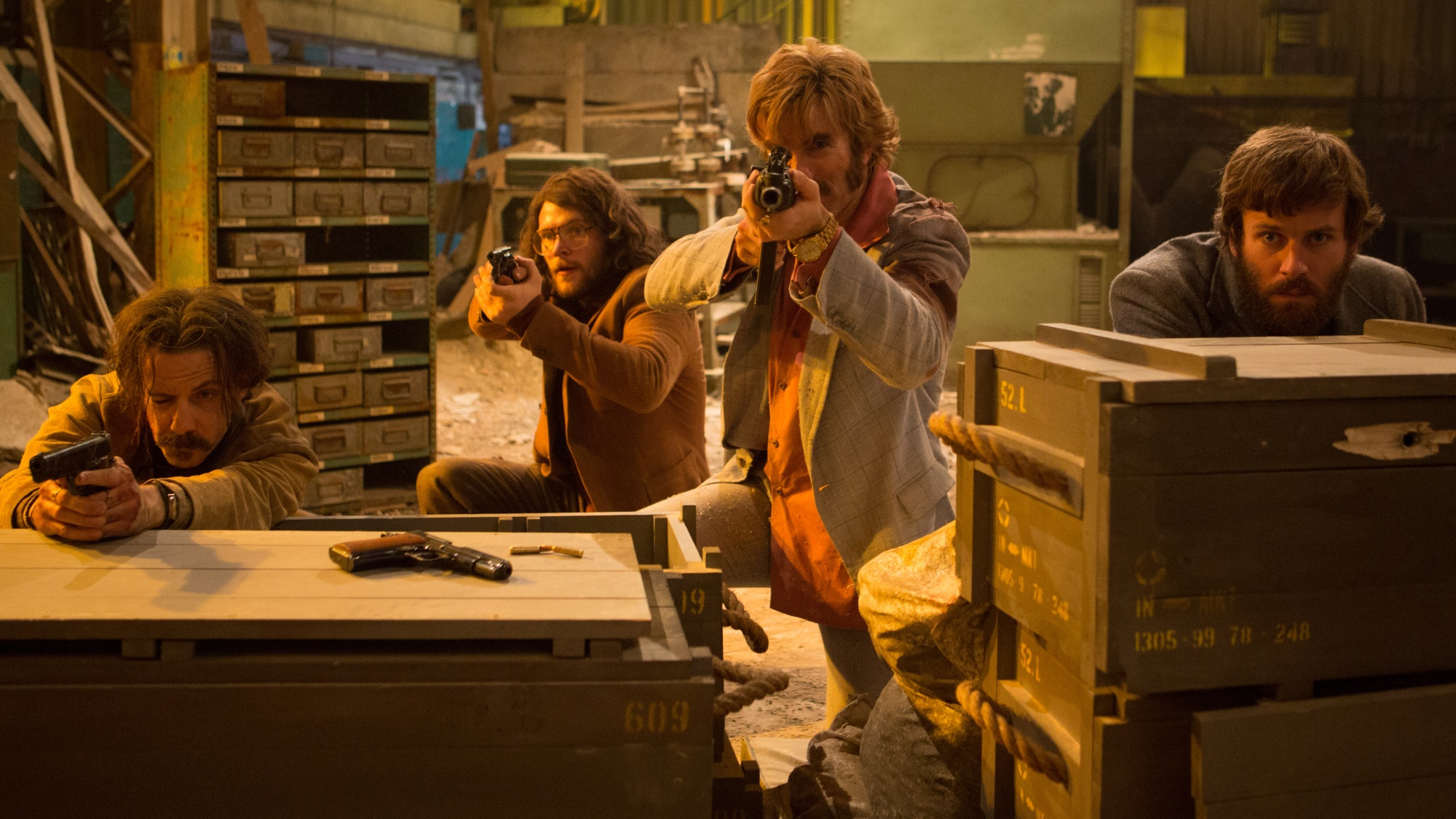Free Fire Film Review
A Bang of Comedy and Absurdist Cinema.
There are only a select few films that can instinctively create more anxiety and tension than the sense of being trapped in a small space. Even if you're not a claustrophobe, almost everyone can relate to that inner panic or high rigidity that floods in when placed in such a harrowing situation. It's a testament to the power of cinema that certain movies that can often make us feel this way; viscerally transporting us to a place which makes us feel as though the walls are closing in. From the minimalist cinematic terror of Rodrigo Cortés' Buried to the tensely potent thriller of Joel Schumacher's Phone Booth, not only do these filmic examples exemplify these enclosed feelings, but utilise distinctive filming aspects that make the space and the scenario presented compelling to watch. Much of the same can be said of Ben Wheatley's latest film of Free Fire, a film set in a tight and overblown action-orientated space that doesn't hold back in instilling exaggerated comedic bravado. While it's inevitable that many audiences will find a similar narrative distinction from this film with Tarantino's Reservoir Dogs, it's the inordinate nature which audiences will latch on-to with Free Fire. The question is, does this extravagant film-making and writing remain mesmeric throughout the entirety of the run time?...
Set in Boston, 1978, a meeting between a group of arms dealers and arms buyers in a deserted warehouse turns into a shoot-out and a game of survival. When the deal goes outrageously wrong, Justine finds herself caught in the cross-fire; forced to navigate through an abandoned warehouse full of trigger-happy madmen who are all hanging on for dear life...
As entailed in its entirety, Free Fire's contextual premise resides in one location of an abandoned warehouse; a rugged space which formulates as a battleground for an extended and comically-eccentric extended shootout between two gangs. While director Ben Wheatley isn't a stranger into making a film that is fixated in one specific area, Free Fire is a feature that is subtly different from his previous film since everything we witness is displayed through one-singular space; not a multitude of laid out backdrops as seen in his previous filmic endeavour of High-Rise which exquisitely illuminates the dark intricacies of different social-classes through radical actions of the characters. Indeed, with it centralised in one location and emphasising on a concept that is primarily action-orientated, this claustrophobic way of film-making that Ben Wheately one again adopts in Free Fire is both an advantage to said directors style and filmic ideals and a detriment in relation to the narrative progression. As much as Wheatley's efforts in laying out the multiple shoot-outs that take place in this film and how the hand-held camera interchanges with the editing to create a concise continuity is commendable, one of the slight problems that Free Fire upholds is its rather simplistic narrative structure how much lacking-variation there is within a concept that is being stretched to its full capacity. When it comes to filming a full-length feature that is focused in a singular space, or even shooting a lengthy scene, there has to be shrewd variation that is instilled in relation to the dialogue and what specifically the characters are talking about and it how seamlessly threads in conjunction with the main predicament of the plot. A prime of example of this being utilised in a compelling manner, is within Tarantino's Reservoir Dogs as highlighted in the introduction. It's a film which has an assemble of characters that coherently extricate from one another in terms of their unique personalities, the duties and actions they fulfil and how they ultimately talk and interact between themselves. To an extent, much of this intriguing character deliberation, as seen in many Tarantino films of the past, is certainly noticeable within the 1st act set-up of Free Fire where we're introduced with two characters that discuss their antics of the night before the gun deal which, subsequently, gets brought into fruition of the gun-deal taking place is primarily instigates the gun-facade that inevitably happens. Besides this however, much of what proceeds from the opening sequences into the comedic gun-play, is fairly straightforward and routine. While the development of the characters isn't an aspect of the film that needs much attention since you get a general idea of each individuals personalities and that this is a concept which is being stretched to the extremes in regards to a feature-length running time, there isn't any clever deviation, as seen in Wheatley's previous film of High-Rise, that the characters can venture towards. Once the ludicrous shooting begins, with each character suffering from wounds and fatalities that would appear to be shocking in many other films, it's feasible to know what route the narrative will go down and makes the latter stages of Free Fire feel lacklustre and long-winded; especially when you're watching gun-centric dingbats crawl within the deserted warehouse for 90 minutes. In spite of this, the silver-lining that Wheatley interjects within a claustrophobic feature such as this, is the implementation of black and blatant comedy that audiences will either latch onto, or will completely dismiss entirely. The lunacy of the characters actions and what they say to each other, especially that of Shartlo Copley's enactment of the dim-witted Vernon, certainly provide an extra-dimension to this narrative structure that is rather streamlined and is the only real filmic device that fleshes out the rooted characterisation. The one reason perhaps into why many will be thrown off by the comedy is down to the perception that the witty banter, very much an hallmark to the slap-stick sensibility seen in silent cinema, is mildly sporadic and isn't permitted as much as it should be.
For a film such as this which depicts a scenario that is tense-ridden inserts a comic undertone to the proceedings, especially with this feature, it's fundamental that we're introduced to distinctive characters that have their own agenda to the cause at hand. In the case of Free Fire, this is indeed mostly the case as we're presented with psychotic gun-enthusiasts that have their own distinctive features that set them apart from one another. What's disappointing however, as highlighted before, is due to the fact the plot of the film revolves around a band-gang of misfits who are only shown within a constrained location and minuscule time-frame, it's hard to formulate a true understanding of each character and what independent goals they're trying to grasp out of this chaotic situation. As much as the acquaintances of the opposing gang members in the opening sequences of Free Fire make it clear that the actors are enthusiastic enough to make the narrative enthralling right the way through, specifically exemplified when the schmoozing Ord (Armie Hammer) and the calm-and-collected Chris (Cillian Murphy) egg each other on in relation to Brie Larson's character of Justine, much of the character interaction when the gun-play begins is mildly moot and not as engaging as expected from a Wheatley film. This, in turn, makes us question the weak motivations of each of the roles as some don't play any significant role whatsoever. Although her role is a significant part of the narrative, Brie Larson's enactment as the waggish Justine is a prime example of a character that's underplayed since her intermediary role dismisses her significance right through the running-time. The standout performance who steals the screen by contradicting everyone's antics, is the overly-witty performance that Shartlo Copley gives to his role of Vernon who epitomises what Free Fire is all about in terms of its comical-grandeur of a scenario that would have been treated radically differently by a different director.
Aside the confliction of styles that Wheatley integrates as best as possible, in amalgamating a wooden comic-relief subtlety with an action-slant of the gang stand off which is meant to evoke a sense of tension, it has to be mentioned that Free Fire is a well-crafted filmic piece that can wholeheartedly boast in comparison to other films of this day-in-age of its continuity and how the mise-en-scène maintains its ruggedness despite the conflict going on. Although Free Fire sports a narrative that is fairly typical, the editing, which cuts back-and-forth from the different perspectives of the two gangs, is comprehensible and doesn't jerk the way in which we're witnessing the action. Unlike many other films that envelop action-scenes with unnecessary hand-held camera movements and frequently cut-away from one perspective to another instantaneously with no meaning whatsoever, Wheatley constructs Free Fire in a manner that you're not complexed over what you just witness. Despite the fact that characters scream, run and scramble all over the gravelling ground throughout the entirety of the run-time, you actually can understand the physical chaos that is displayed on the silver-screen which is a credit to Wheatley and his crew; especially since they were working in such a tight and enclosed environment.
Although his filmography has always been drastically varied, from the dirty crime-drama of Down Terrace, to the dark-thriller in the form of Kill List and the high-brow concept of High-Rise, what is noticeable to fathom of Ben Wheatley as a film-maker is how much he manages to stick with his own uniquely comically enthralling filmic style in many different genre's. With the latest film of Free Fire, Wheatley manages to, once again, utilise and retain his cinematic ideals by constructing a claustrophobic genre concept that cinema-goers will attach themselves towards. While the streamlined narrative lacks a desired imagination and variation that Wheatley could heave easily influenced more, the premise of a well-formulated and comical shoot-out won't disappoint the general audience. With a crisp 90 minute running-time, Free-Fire stands as one of the most fun and comical one-location films ever made and is likely to be one of the more lively viewing-experiences of this cinematic year...
On that note, it's time for to end this week's review. As always everyone,thank you for reading my latest film review of Free Fire and I hope you've all enjoyed the read!! 😉🔫 If anyone has an opinion on either my review or on the film itself, please feel to drop a comment down below. Next week, I'll be reviewing the famed Japanese animated series of Attack On Titan and its recent finished 2nd season. Once again, thank you to everyone for readings this week's Blog Post, and I'll see you all next week! Have a nice weekend! Adieu! 😀😎✌
7/10 - Alex Rabbitte



Comments
Post a Comment